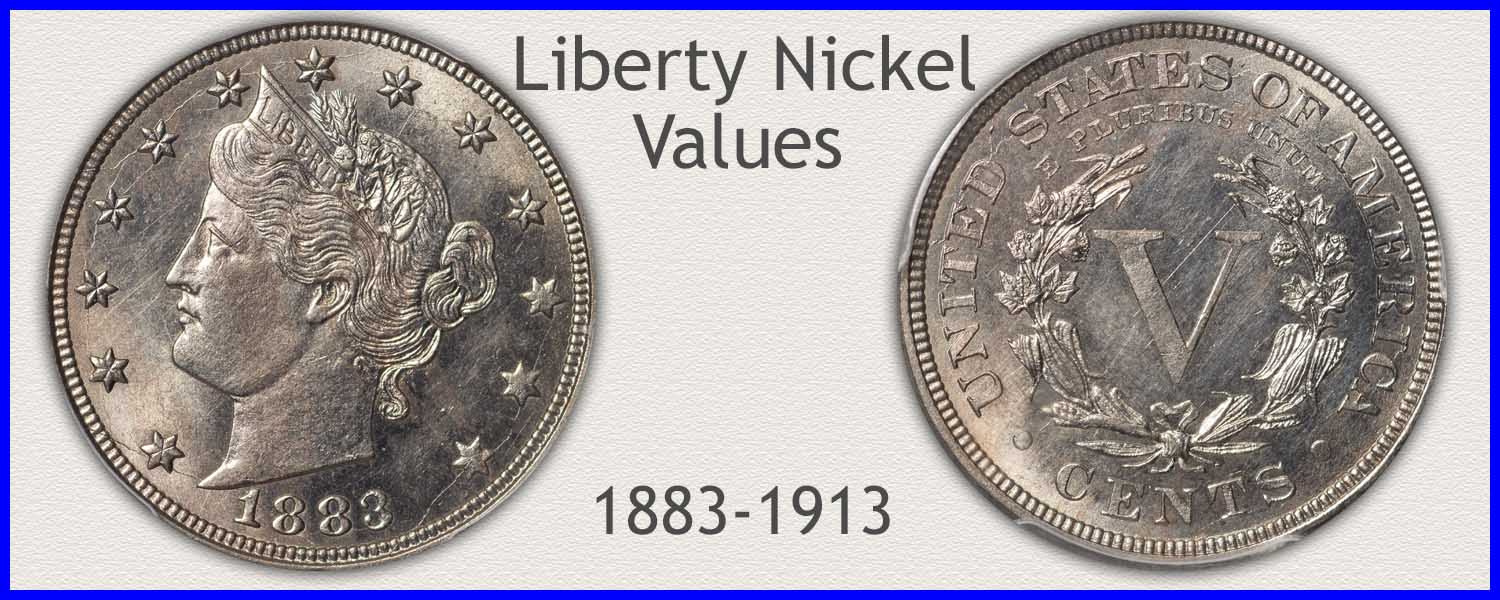Coin Values Moving with Precious Metals: Up-Dated 2/9/2026: Gold $5024 | Silver $81.82
1896 Nickel Value
Examples in a condition other than heavily worn are unusually scarce and add to 1896 nickel value. Most of these early Liberty nickels are so heavily worn they have little market value today.
An evaluation of condition and identification of the coin series, the year of minting, and subtle added qualities are all considered when determining worth. A thorough examination of the coin's surface and general condition ensures accuracy. Images highlight the coin's features, all of which are required for the value process described below.
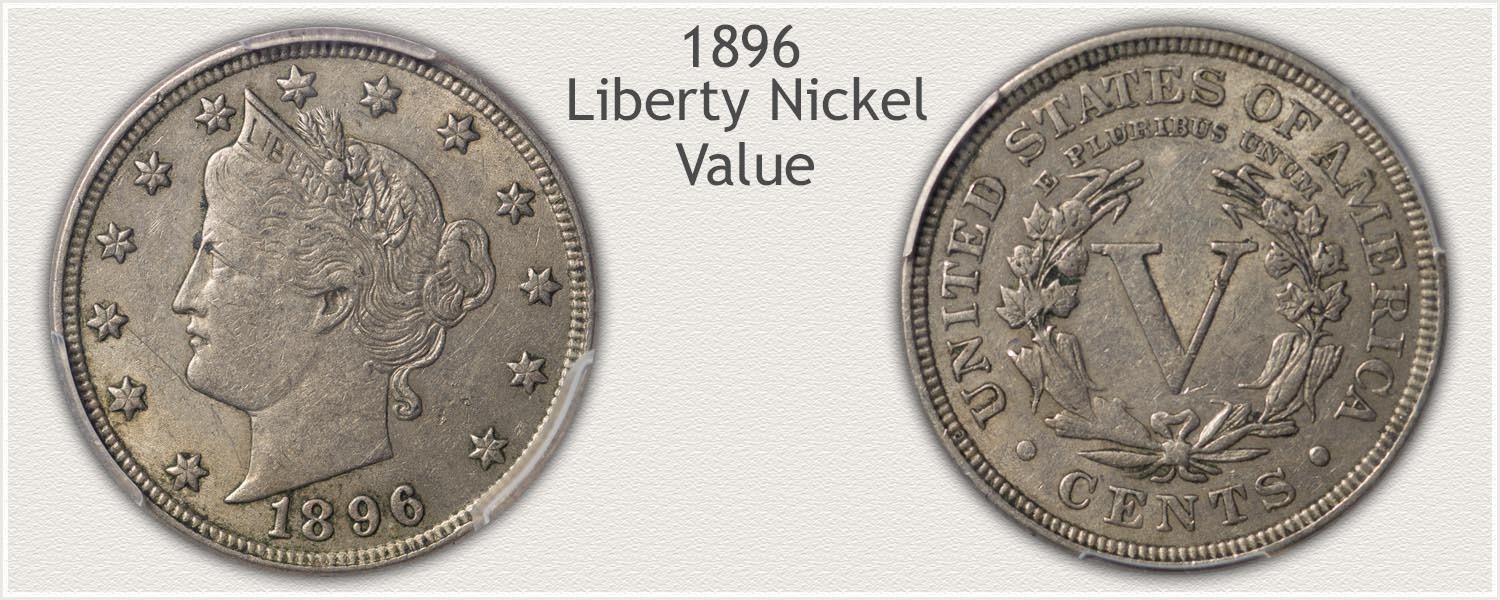
Steps Leading to Value:
- Step 1: Date Identified - It is important to record the date accurately and series of these nickels.
- Step 2: Grading Condition - Condition of the coin determines its value potential. The process of grading starts by identifying the presence of wear on the coin.
- Step 3: Special Qualities - Collectors are attracted to different levels of quality of these old series nickels.
| 1896 Nickel Value | ||||
|---|---|---|---|---|
| Condition of Coin | ||||
| Date | Good | Fine | Extremely Fine |
Mint State |
| Liberty Nickel Value Updated | 2026 | |||
| 1896 | $7 | $30 | $84 | $211 |
Listings on the value chart are a range of the wholesale market for 1884 nickels. As a guide, use these listings as a starting point to determine how much they are worth. Variables are demand, the dealer's needs, and overall quality of the coin.
Step 1: The 1896 Nickel: A Close Look Needed for an Accurate Date Reading
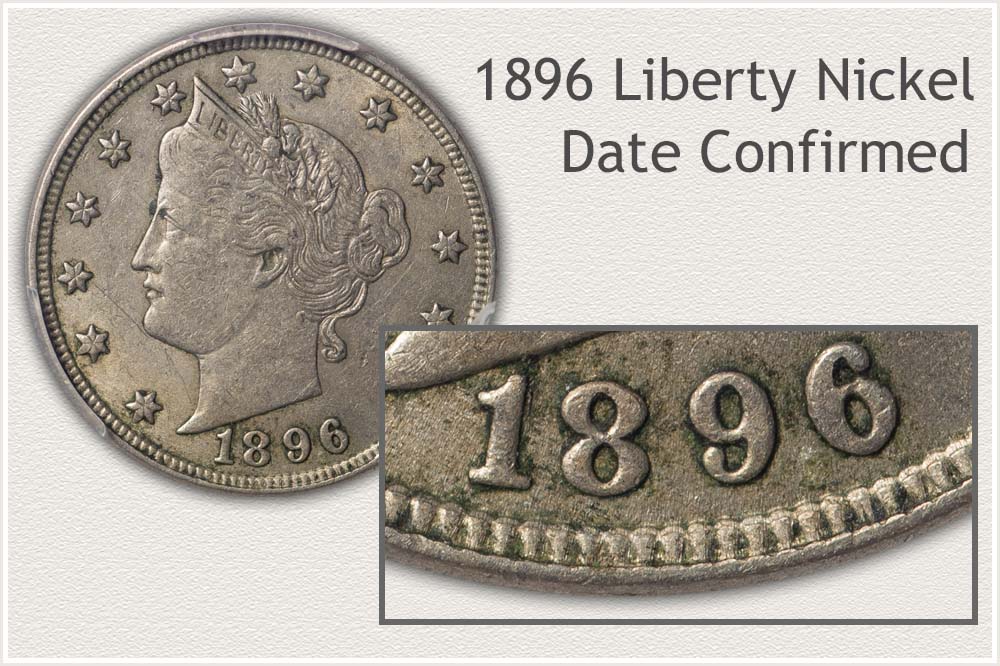
Now becoming an above average value part of the Liberty series, 1896 nickels are among a short list of low mintage dates. Minted only at the Philadelphia facility, a total of only 8.8 million were produced. Typical quality of remaining early Liberty nickels displays heavy wear. A sparce quantity struck, early in the series, plus difficulty obtaining quality examples, provides a strong base to how much they are worth.
Because of the style used in the numerals of the date, detecting the difference of the numbers "8" "9" and "6" requires a close inspection. However, using magnification provides an accurate reading.
Step 2: | Matching to Images Identifies a Grade
A Premium Increase When Higher Quality is Identified
One of the key factors of 1896 nickel value is a close determination of its condition. All Liberty nickels trade in the coin market based on condition. Date of the coin, mint of issue, and condition termed as a "grade" are part of a complete description.
Grades represent different stages of preservation and wear. Definitions and descriptions of grades are used to inspect features, judging the presence of details remaining within the design. Stages of wear have specific patterns on coins; these are used to recognize their grade. Begin with a close match of the coin to one of the images representing the different grades.
Mint State Grade
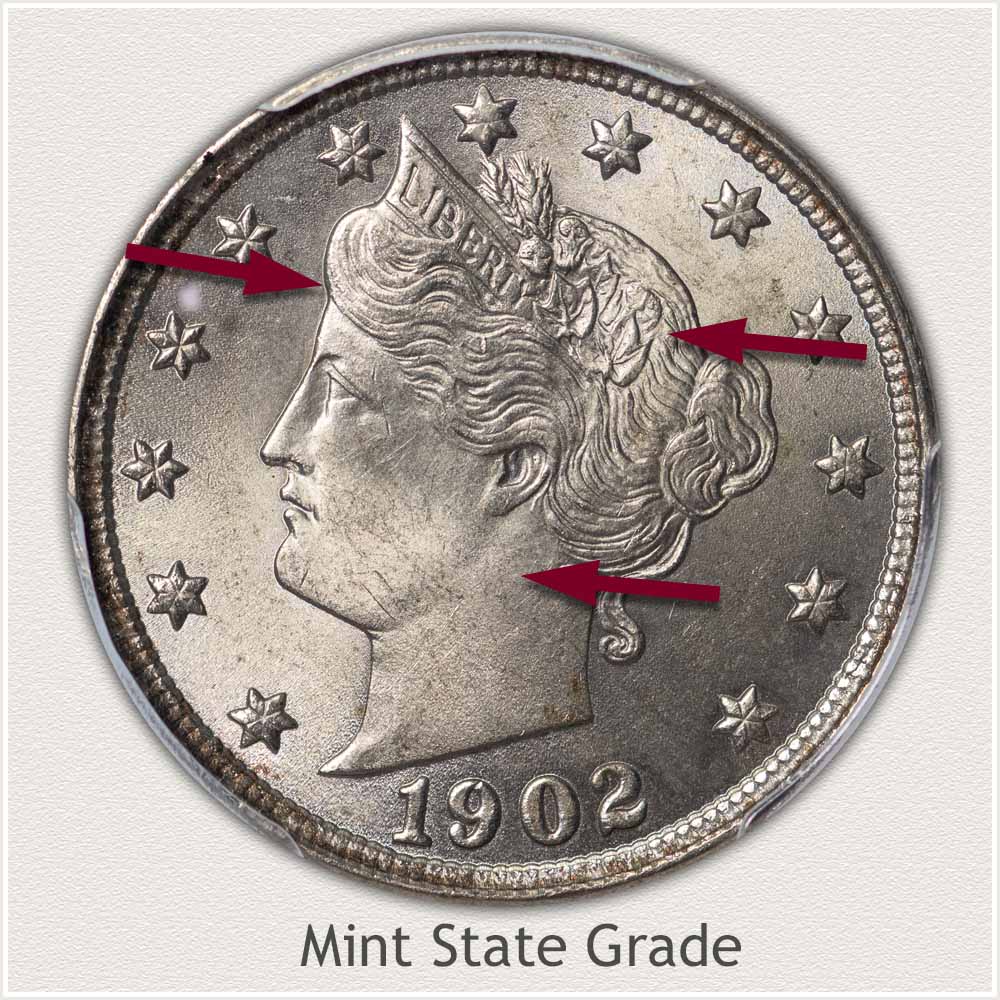
Mint State: Many details are examined as part of recognizing a Mint State grade nickel. Starting at the outer rim and moving inward to the thirteen stars, framing a highly detailed portrait of Liberty. Top-quality nickels are defined and summarized as - no wear - the surface.
A coin's surface acquires a brilliant mint luster as a result of the force used to strike the metal. Key factors determining the mint state grade include completeness of the shine and texture of the luster. Texture and luster of Liberty's cheek and neck remain the same as when first minted, no wear has caused the metal to appear dull.
Next, small detailed high points of the design are examined for signs of wear. One of Liberty's typical wear points is found in the hair just above her brow. There is no sign of flattening in the high contours of hair and all remain separated by recessed lines. Metal becomes visibly flattened and smooth when worn. To see any reduction to rounded contours more clearly, tilt the coin at a low angle to a light. Examine the fine edges of the leaves above the hairband, and look for signs of metal smoothness and flattening of the contours. A brilliant quality is present throughout.
Extremely Fine Grade
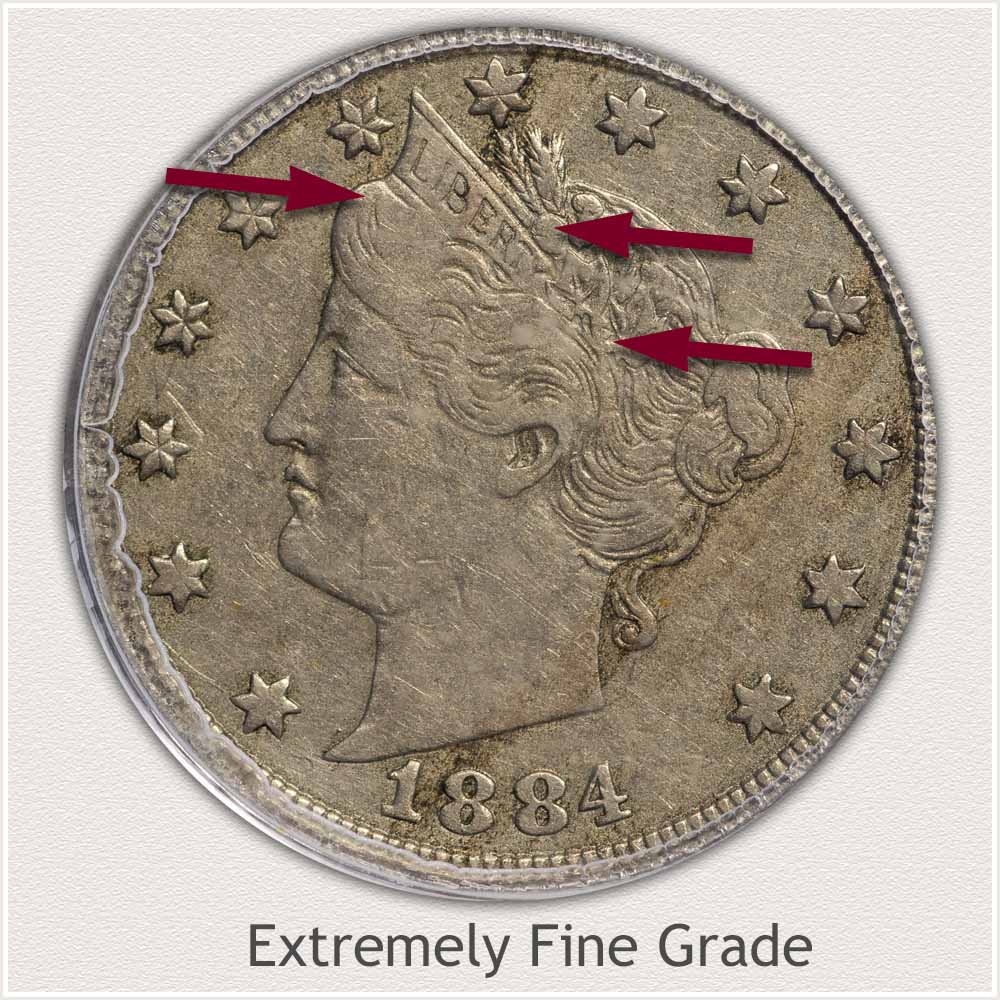
Extremely Fine: A nickel in Extremely Fine condition with light circulation is just starting to show signs of wear. It is defined as wear that occurs only at high points of the design. Another visual characteristic is the separation of noticeable wear areas by strong design features.
Liberty's hair above her forehead shows some fading directly above her eye due to this light wear. Also, there is a small area of smoothness above the ear, and the hair at the back of her head shows evidence of missing fine line details. Each worn point shows one of the design's highest points. Most full lines in the hair waves still exist in lower relief areas. Importantly to qualify for the grade, there is a clear disconnect from one worn area to the next.
Within her headband, complete letters of "LIBERTY" are visible and recognizable evidence of light wear. The letter "I" is just starting to show signs of weakness, this is the highest contour of the design. The rest of the letters remain deeply impressed. Overall appearance of an Extremely Fine grade Liberty nickel is of a coin in high collector quality, with bold details.
Fine Grade
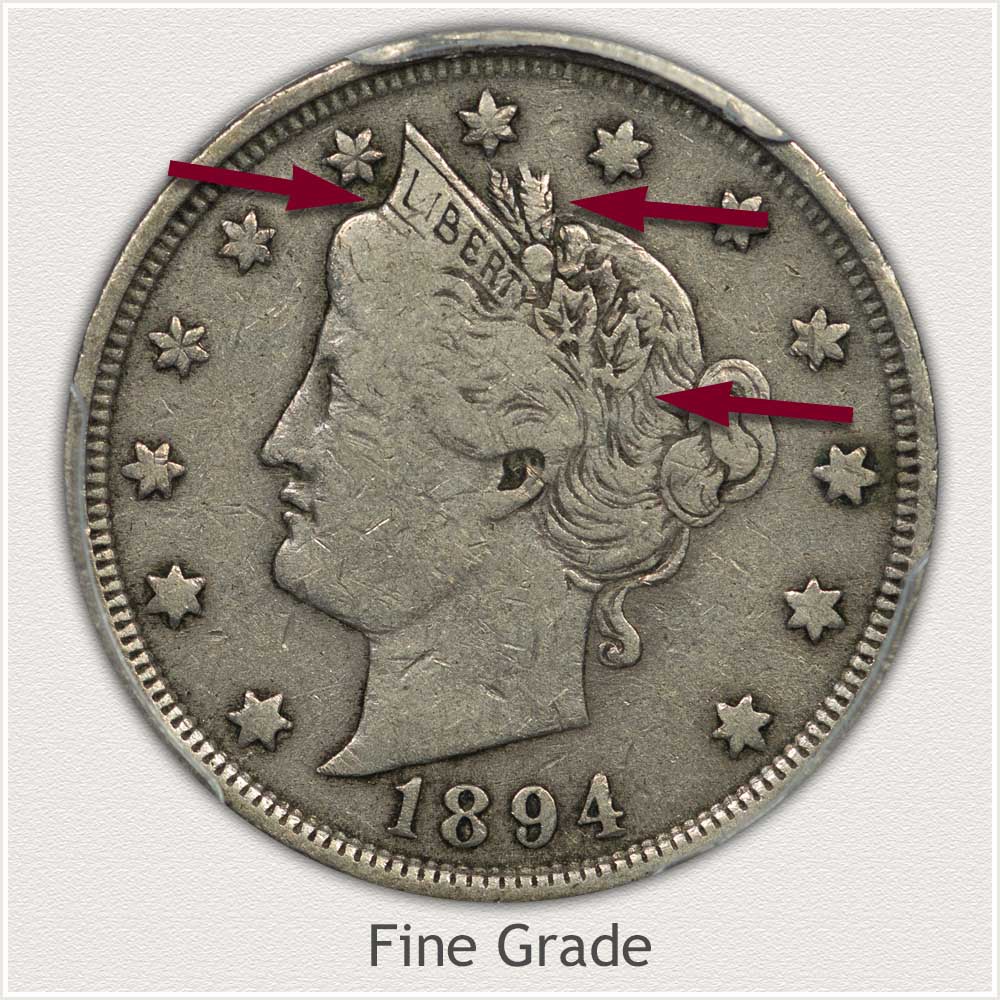
Fine Grade: A Liberty nickel is considered in Fine grade range once the amount of wear has reached the point where many portions of the design are blending. An overall view of condition shows the sharpness of design is reduced moderately, leaving only partial evidence of hair strands and hair wave details. Helping confirm this coin's status within the Fine grade category, hair waves towards the back of Liberty's head show some details to the strands.
A second area to judge, the two spikes of wheat grains and leaf edges within the wreath above her headband are noticeably flattened. Judging the grade as Fine depends on the complete separation of the leaves' edges from the hair and visible grains within one wheat spray.
Fully defined letters in "Liberty" are a strong feature needed to reach the grade quality. A market requirement is all letters are visible and complete. The letter "I" is typically less pronounced, however, is full from top to bottom. For many Liberty nickel collectors, this early era coin is in high demand.
Good Grade
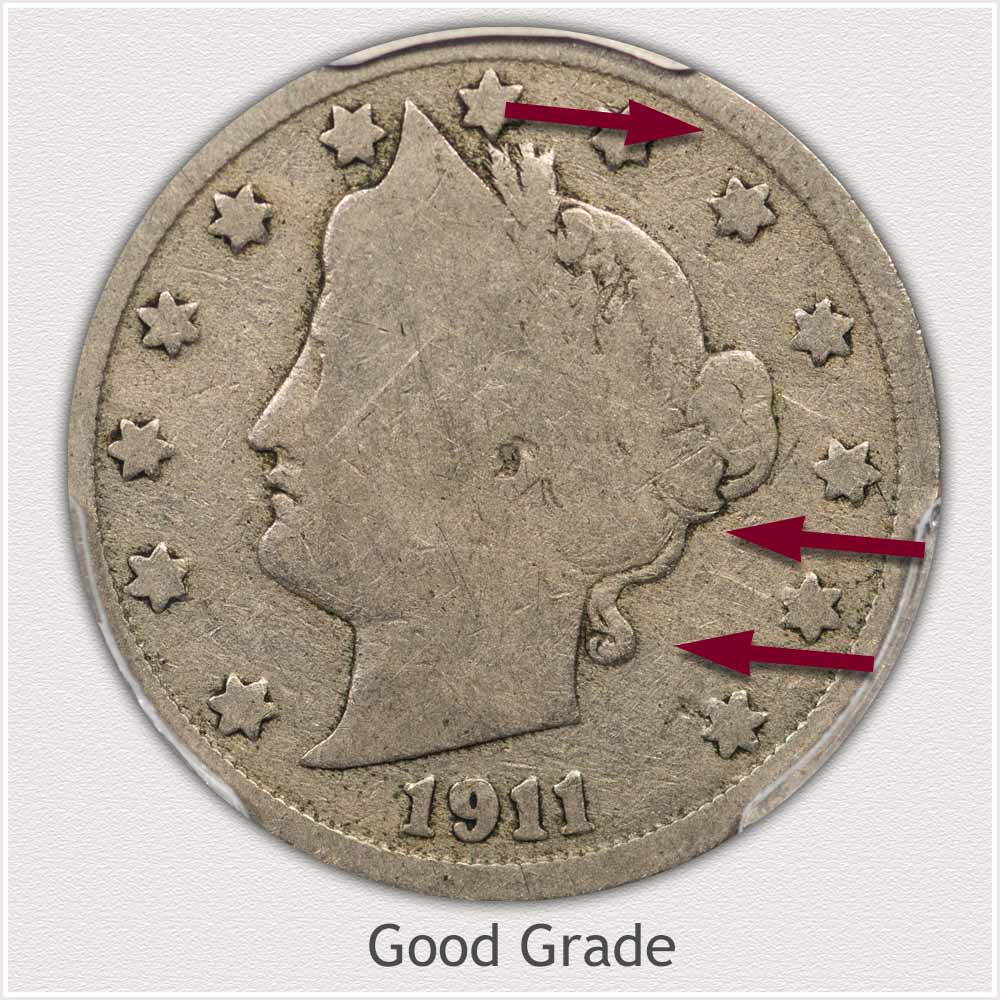
Good Grade: Even though the example displays significant wear, the nickel is in Good condition because its key features are still bold and clearly defined. In order to identify the grade, a coin shows heavy wear, although major features do not blend into the fields. In Good condition, the important elements of the design of a Liberty nickel are still clearly visible.
Examining the portrait, Liberty's outline is completely intact and raised without any fading. Confirm her head is clearly separated from the field when examining the portrait at the back of her head. In addition, the date, stars, and the rim are all fully outlined, and distinct from both the field and each other.
Details of the wreath near the top of her head and a visible small curl of hair behind her neck add to the coin's appeal. These Liberty nickels have a quality appearance when displaying smooth, honest, and even wear. Increasing its aesthetic value and collectability.
How to Video: Grading Liberty Nickels
A difference in recognizing higher quality leads to a narrow listing of values seen on the above chart. Viewing close-up features of each grade is presented in the video. Follow the key elements highlighted in the descriptions to identify a specific grade.
Grading Liberty Nickels | Visual Grading Guides
Step 3: Special Qualities | Expert Grading Services
1896 Nickels and Recognizing Their Full Value Potential
1896 is a year the supply of circulated examples, with just light wear, presents difficulty in finding a pleasing coin to add to a collection. Many collectors of the Liberty nickel series pursue a quality coin with just light wear as an alternative to the high premiums of Mint State coins. As noted on the chart, a quickly rising value profile from one grade to the next highlights existing supply of Extremely Fine pieces is limited. Demand for this quality coin is meeting a limited supply.
Condition of Liberty nickels is becoming a strong factor in determining value. A subtle improvement in the overall detail results in a noticeable rise in both demand and premium.
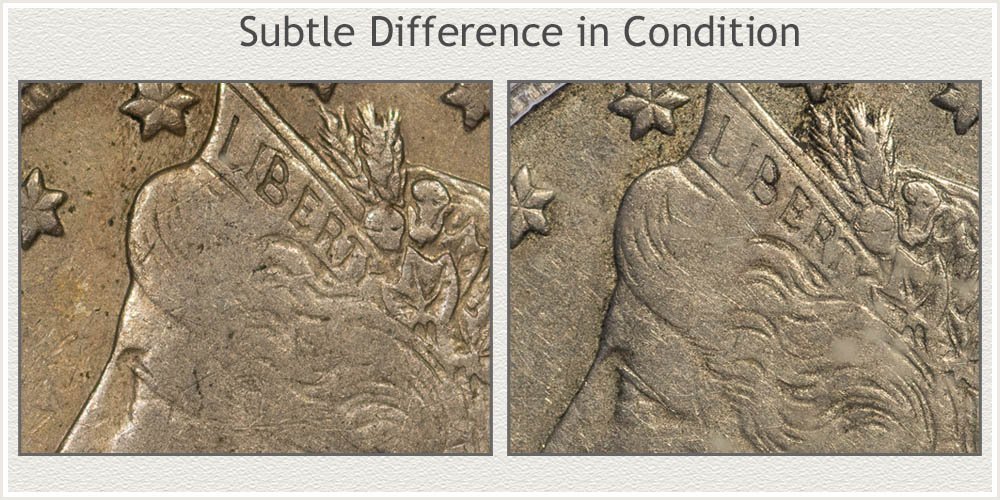 Close-Up of Extremely Fine Grade to Slightly Lower Quality
Close-Up of Extremely Fine Grade to Slightly Lower Quality
When viewing the above close-ups of Liberty's portrait, both are very similar in their condition. An experienced hobbyist, familiar with the series, favors the coin on the right. It meets the qualities of the Extremely Fine grade. Slightly more detail, crispness, and appeal is a challenge to find. Premiums are now rising.
To realize the potential of an 1896 nickel, often these upper quality coins are submitted to one of the top two grading services. Having an expert grade provides assurance of its state of preservation.
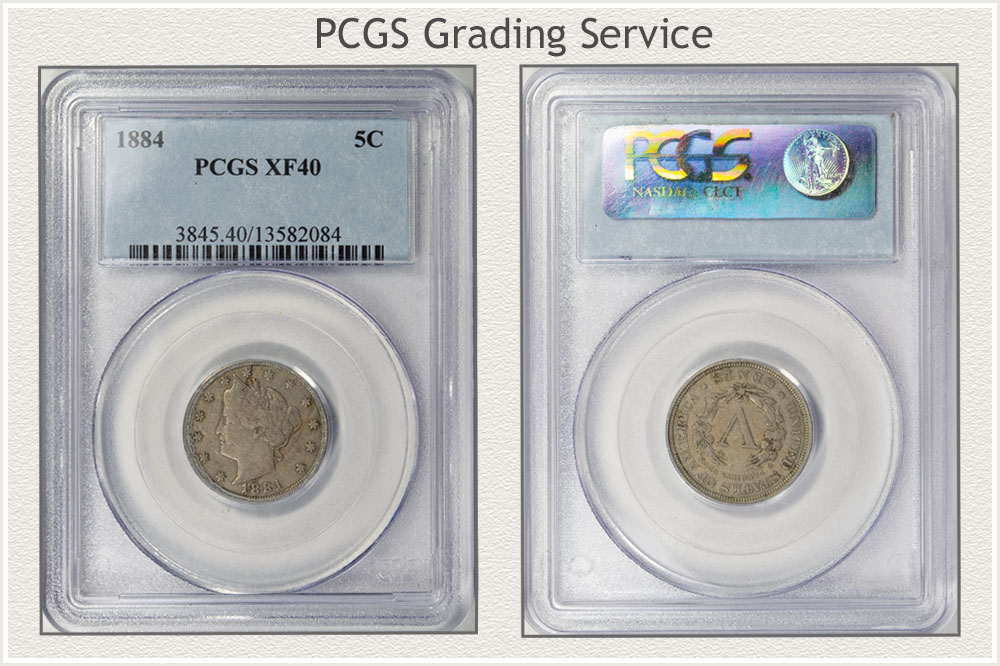 PCGS Graded Liberty Nickel in Extremely Fine Grade Condition
PCGS Graded Liberty Nickel in Extremely Fine Grade Condition
PCGS (Professional Coin Grading Services) reviewed in hand the above nickel, determined a grade of Extremely Fine, and encapsulated the coin. It now has a market accepted grade classification and a narrowed value range. With confirmation of condition, referencing value charts is done with confidence.
Note the encapsulation of the nickel. It becomes protected from further decline from abrasions, wear, and the environment. Handling is safe and storage is improved.
Judging the finer points to condition by a grading service involves a fee. Potential value of the coin in the one hundred dollar and above range is generally when these fees are feasible.
An Introduction | Coin Grading Services are now an important part to the hobby. Both PCGS and NGC (Numismatic Guaranty Company) are the primary services used by collectors.
References
U.S. Mint. 1897 U.S. Mint Annual Report
https://nnp.wustl.edu/library/book/318
U.S. Mint. Catalogue of Coins of the United States.
https://nnp.wustl.edu/library/book/554591
Coin Values | CoinStudy Articles
Date by Date
In Depth Liberty Nickel Values
1883 to 1912
The Value of V Nickels | Values Listing of all Dates
Many dates of the Liberty nickel series are worth a premium in all grades of condition. A complete list of dates and mint varieties is found on the value chart.
Rare nickels are found in all the different design series. Five cent nickels, first introduced in 1866 with the Shield design, are an example of many scarce dates. Highlights include the Liberty, Buffalo, and Jefferson dates and mints becoming difficult to find.
Safe Coin Storage | Liberty Nickel Recommendations
Protecting old nickels from humidity is a first consideration to maintaining their value. Review a few coin holders and storage methods for keeping coins protected long term. Safe handling is also provided by products specific to coins.
Print the Coin Values Worksheet
A printable sheet to organize important information about coin holdings. List descriptions and values starting with your Liberty nickels and add all coins as they are evaluated.
Selling Coins | A Defined Process
During the selling process, key information is needed. Review the methods used by the hobbyist in the coin market. Determine an estimate of value and reference the listing of dealers to contact.
★Coin Values Discovery finds 1896 Nickel Value and...
A step-by-step process discovers all U.S. coin values. Images identify the different series of coins covering all denominations from cents through gold coinage. Each is further detailed with important elements and features key to a complete and accurate worth. A box of old coins has potential.
